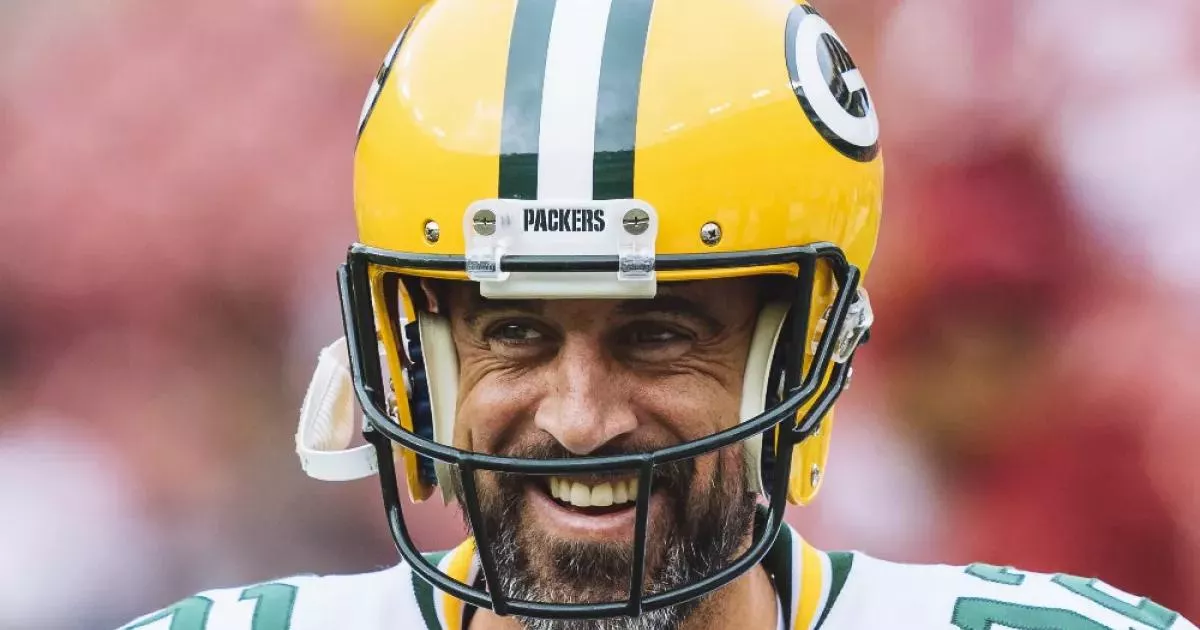Aaron Rodgers is a professional American football quarterback currently playing for the Pittsburgh Steelers. Previously, he played college football at the University of California, where he set school records for low interception rates. Rodgers was drafted by the Green Bay Packers in the first round of the 2005 NFL draft and is widely considered one of the greatest and most talented quarterbacks in NFL history.
1962: Rodgers becomes first quarterback since Y. A. Tittle to throw for at least 480 yards, four touchdowns and no interceptions
In 2013, Aaron Rodgers became the first quarterback since Y. A. Tittle in 1962 to throw for at least 480 yards, four touchdowns and no interceptions in a game.
1966: Bart Starr's Passer Rating
In 2009, Rodgers' passer rating of 103.2 was also third-highest in team history at the time, behind only Bart Starr's 105.0 rating in 1966
1968: Bart Starr's Passer Rating
In 2009, Rodgers' passer rating of 103.2 was also third-highest in team history at the time, behind only Bart Starr's 104.3 rating in 1968
1969: Daryle Lamonica threw six touchdown passes in the first half
In 1969, Daryle Lamonica threw six touchdown passes in the first half. In 2014, Aaron Rodgers became the second player in NFL history and the first since Daryle Lamonica in 1969 to throw six touchdown passes in the first half.
1970: Yards per attempt becomes official stat
In 1970, yards per attempt became an official statistic in the NFL. In 2011, Aaron Rodgers had 9.2 yards per attempt, the fourth-highest since becoming an official stat.
1973: Father's Football Career at Chico State
In 1973, Edward Wesley Rodgers, Aaron Rodgers' father, began playing football as an offensive lineman for the Chico State Wildcats.
1976: Father's Last Year Playing Football at Chico State
In 1976, Edward Wesley Rodgers, Aaron Rodgers' father, played his last year as an offensive lineman for the Chico State Wildcats.
December 2, 1983: Aaron Rodgers' Birth
On December 2, 1983, Aaron Charles Rodgers was born. He is now a professional football quarterback.
1992: First Start Since 1992
In 2008, Aaron Rodgers' debut as a starter marked the first time since 1992 that a quarterback other than Brett Favre started a regular season game for the Packers.
1996: Packers Franchise Record
In 2009, the Packers broke the previous record held by the 1996 Super Bowl team (456) by scoring 461 total points, setting a new franchise record.
1997: Family Returns to Chico
In 1997, the Rodgers family moved back to Chico, and Aaron attended Pleasant Valley High School.
2001: Set School Record
In 2001, Aaron Rodgers set a single-season school record with 2,466 total yards at Pleasant Valley High School.
2002: Graduated from Pleasant Valley High School
In spring 2002, Aaron Rodgers graduated from Pleasant Valley High School.
2003: Tied School Season Record
In 2003, Aaron Rodgers tied the school season record for 300-yard games with five and set a school record for the lowest percentage of passes intercepted at 1.43%.
2003: Named Starting Quarterback at Cal
In the fifth game of the 2003 season, Aaron Rodgers was named the starting quarterback at Cal, leading the Golden Bears to a 7-3 record.
2004: Led Cal to Top-Five Ranking
In 2004, as a junior, Aaron Rodgers led Cal to a 10-1 record and a top-five ranking at the end of the regular season. He finished the season with 2,566 passing yards and 24 touchdowns.
August 2005: Signed Deal with Packers
In August 2005, Aaron Rodgers signed a five-year, $7.7 million deal with the Green Bay Packers.
December 19, 2005: Played Against Ravens
On December 19, 2005, Aaron Rodgers entered the game against the Baltimore Ravens, completing 8 of 15 passes for 65 yards and an interception.
2005: Entered the NFL Draft
After the 2004 season, Aaron Rodgers decided to forgo his senior season to enter the 2005 NFL draft.
2005: NFL Draft Prospect
In 2005, Aaron Rodgers was expected to be selected early in the NFL draft due to his impressive junior year stats at Cal.
2005: Drafted by the Green Bay Packers
In 2005, Aaron Rodgers was selected by the Green Bay Packers in the first round of the NFL draft after playing college football for the California Golden Bears.
November 19, 2006: Broke Left Foot Against Patriots
On November 19, 2006, Aaron Rodgers broke his left foot while playing against the New England Patriots, causing him to miss the remainder of the 2006 season.
November 29, 2007: Replaced Injured Favre Against Cowboys
On November 29, 2007, Aaron Rodgers stepped in for an injured Brett Favre against the Dallas Cowboys, completing 18 passes for 201 yards and throwing his first touchdown pass.
2007: Patriots score more points than Packers in 2011
In 2007, the Patriots scored more points than the Packers in 2011. As of 2016, the 2007 Patriots and 2013 Broncos scored more points than the Packers.
2007: Rumors of Trade to Raiders
Prior to the 2007 season, rumors suggested Aaron Rodgers might be traded to the Oakland Raiders for Randy Moss, but the trade never materialized.
March 4, 2008: Favre's Retirement Opens Starting Position
On March 4, 2008, Brett Favre's retirement announcement opened up the starting quarterback position for Aaron Rodgers for the 2008 season.
October 31, 2008: Signed Contract Extension
On October 31, 2008, Aaron Rodgers signed a six-year, $65 million contract extension with the Packers through the 2014 season.
2008: Became Packers' starting quarterback
In 2008, Aaron Rodgers became the starting quarterback for the Green Bay Packers after backing up Brett Favre for three years.
2008: Comparison to Peyton Manning's MVP streak
In 2022, Aaron Rodgers became the fifth player to win consecutive MVPs and first since Peyton Manning between 2008 and 2009.
2008: Rodgers' most interceptions since 2008
In the 2022 season, Rodgers finished with 12 interceptions, which marked the most for Rodgers in a single season since 2008.
2008: Rodgers' "Championship Belt" touchdown celebration debut
Since becoming a starter in 2008, Aaron Rodgers has become known for his unique touchdown celebration, the "Championship Belt," drawing praise and becoming a fan favorite.
October 2009: Named NFC Offensive Player of the Month
In October 2009, Aaron Rodgers was named NFC Offensive Player of the Month after passing for 988 yards, completing 74.5% of his passes, and achieving a passer rating over 110 in all three games played during the month.
2009: First Win in Comeback Situation
During the opening game of the 2009 season, Rodgers achieved his first win in a comeback situation against the Chicago Bears, contributing to a 21-15 victory.
2009: Lowest Passing Interception Percentage Leader
In 2009, Aaron Rodgers led the NFL in lowest passing interception percentage.
2009: Packers' 55-7 win vs. the Titans
In 2009, the Packers had a 55-7 win vs. the Titans. In 2014, the 55–14 victory tied the Packers' 55–7 win vs. the Titans in 2009 for the most points scored by a Rodgers-led offense.
2009: Comparison to Peyton Manning's MVP streak
In 2022, Aaron Rodgers became the fifth player to win consecutive MVPs and first since Peyton Manning between 2008 and 2009.
2010: Super Bowl XLV Victory
In 2010, Aaron Rodgers led the Green Bay Packers to victory in Super Bowl XLV and was named the Super Bowl MVP.
2010: Rodgers named FedEx Air NFL Player of the Year
In 2010, Aaron Rodgers was recognized for his exceptional passing performance and was named the FedEx Air NFL Player of the Year.
2010: Overtime Losses
In 2010, Rodgers led the Packers to a 2-0 start, but then lost three of their next four games, including back-to-back overtime losses, bringing Rodgers' record in overtime games to 0-5.
2010: Packers win final two regular season games to qualify for playoffs
In 2010, after a road loss to the Patriots, the Packers, with an 8-6 record, needed to win their final two regular-season games to make the playoffs. Aaron Rodgers led the team to victory in both games, including one against the New York Giants, where he threw for 404 yards and four touchdowns, earning him the NFC Offensive Player of the Week. The Packers then defeated the Bears 10-3 in the regular-season finale.
January 23, 2011: Packers Beat Bears in NFC Championship
On January 23, 2011, Aaron Rodgers and the Packers defeated the Chicago Bears 21-14 in the NFC Championship. Rodgers had a 55.4 passer rating in the game.
2011: Achieved at least 400 passing yards, two passing touchdowns, and two rushing touchdowns
In 2011, Aaron Rodgers achieved at least 400 passing yards, two passing touchdowns, and two rushing touchdowns against the Denver Broncos.
2011: Rodgers sets numerous NFL records and wins MVP award
In 2011, Aaron Rodgers set numerous NFL records, including recording a passer rating of over 100.0 in thirteen games, and won the league's MVP award, receiving 48 of the 50 votes. Rodgers also finished second for the AP Offensive Player of the Year award.
2011: Associated Press Athlete of the Year and NFL MVP
In 2011, Aaron Rodgers was named Associated Press Athlete of the Year and voted league MVP by the Associated Press for the NFL season.
2011: Rodgers earns multiple NFC Offensive Player of the Week honors
In 2011, Rodgers earned multiple NFC Offensive Player of the Week honors: once in Week 4 after a 49–23 victory over the Denver Broncos, and again in Week 9, following a 45–38 victory over the Chargers. Additionally, in Week 6, Rodgers had a career-high 93-yard touchdown pass to Jordy Nelson in a 24-3 victory over the St. Louis Rams. By week 15, the Packers' 13-0 start was upset by the Kansas City Chiefs 19-14, ending their winning streak at 19 games, the second-longest winning streak in NFL history.
2011: Rodgers sets single-season franchise records
In 2011, Rodgers finished the season with 4,643 passing yards, 45 touchdown passes, and six interceptions, for a passer rating of 122.5, setting single-season franchise records. He also led the league in touchdown to interception ratio (7.5), touchdowns passing % (9.0%), and yards per attempt (9.2), while earning NFC Offensive Player of the Month awards for September, October, and November, and FedEx Air Player of the Week six times. He was the winner of the 2011 Galloping gobbler as MVP of the Thanksgiving game between the Packers and the Lions, a 27–15 Green Bay victory, and tied an NFL record for consecutive games with at least two touchdown passes (13).
2011: Rodgers earns NFC Offensive Player of the Week
In 2011, despite the NFL lockout and lack of official off-season workouts, Rodgers and the Packers defeated the Saints 42–34. Rodgers earned NFC Offensive Player of the Week with 312 passing yards and three touchdowns.
2011: Rodgers passes for over 1,000 yards in a single postseason
In 2011, following his playoff performance, Aaron Rodgers became the third player in NFL history to pass for over 1,000 yards in a single postseason. He also became one of four quarterbacks to record over 300 passing yards, with at least three touchdown passes, and no interceptions in a Super Bowl. Rodgers finished with 1,094 passing yards, nine touchdown passes, two rushing touchdowns, and two interceptions, while completing 68.2% of his passes for a passer rating of 109.8. Rodgers was ranked 11th by his fellow players on the NFL Top 100 Players of 2011.
2011: Packers upset by Giants in Divisional Round
In 2011, the Packers were upset by the New York Giants in the Divisional Round by a score of 37–20. The 2011 Packers became the only team in NFL history to go 15–1 and not win a playoff game. Rodgers was named to the Pro Bowl for his 2011 season to go along with a First-team All-Pro honor.
2011: Interview with E:60
In a 2011 interview with E:60, Aaron Rodgers discussed the lack of attention he received from Division I programs due to his physical stature in high school.
January 5, 2012: Rodgers Initiated as Honorary Member of Tau Kappa Epsilon
On January 5, 2012, Aaron Rodgers was initiated as an honorary member of Tau Kappa Epsilon (TKE) at the Sigma-Xi Chapter at St. Norbert College.
2012: Touchdown-to-Interception Ratio and Passer Rating Leader
In 2012, Aaron Rodgers led the NFL in touchdown-to-interception ratio and passer rating for the season.
2012: Packers lose to 49ers
In 2012, Rodgers and the Packers started off the season with a 30–22 loss to the 49ers. Because of the loss, Rodgers lost his bet with the music group Boyz II Men, and had to wear an Alex Smith jersey during the next week of practice.
2012: Rodgers voted best player in the league
In 2012, Rodgers was voted by his fellow players as the best player in the league on the NFL Top 100 Players of 2012.
2012: Rodgers nominated to Pro Bowl
In 2012, the Packers defeated the Minnesota Vikings in the Wild Card Round but were beaten by the 49ers in the Divisional Round. Rodgers earned his third career Pro Bowl nomination for his performance in the 2012 season.
April 26, 2013: Rodgers agrees to contract extension with Packers
On April 26, 2013, Rodgers and the Packers agreed to a 5-year, $110 million contract extension, making him the highest-paid player in NFL history.
2013: Rodgers Allegedly Shares Sandy Hook Conspiracy Theories
In 2013, Aaron Rodgers allegedly shared false conspiracy theories about the Sandy Hook massacre, claiming that the attack was an "inside job" perpetrated by the government.
2013: Rodgers Makes Cameo on The Office
In 2013, Aaron Rodgers made a cameo appearance on an episode of The Office.
2013: Rodgers ranked sixth by peers on NFL Top 100 Players
In 2013, Rodgers was ranked sixth by his peers on the NFL Top 100 Players of 2013.
2013: Rodgers' 2011 season ranked as third greatest passing season of all time by ESPN
In 2013, Rodgers' 2011 season was ranked as the third greatest passing season of all time by ESPN and was regarded as the most efficient.
2013: Rodgers throws for career high 480 passing yards
In 2013, The Packers began their 2013 season against the reigning NFC champions, the 49ers, the team that also ended their playoff run the previous season. Rodgers went 21 for 37 in completions, 333 yards, three touchdowns and an interception in the 34–28 loss. The following week, Rodgers had a career-high 480 passing yards to tie the franchise record in the 38–20 home-opener win against the Washington Redskins. He earned NFC Offensive Player of the Week for his effort against the Redskins.
2013: Rodgers returns from injury to clinch NFC North
In 2013, after rallying in December, Packers head coach Mike McCarthy announced Rodgers would return and start in the season-finale showdown against the Chicago Bears for the NFC North championship. Rodgers threw for 318 yards and two touchdowns, connecting with Cobb for a game-winning touchdown to clinch the NFC North. Rodgers won the 2013 GMC Never Say Never Award for the come-from-behind, division-winning touchdown pass. Rodgers finished fifth in the league in passer rating (104.9), completion percentage (66.6%), and yards per game (282).
2013: Broncos score more points than Packers in 2011
In 2013, the Broncos scored more points than the Packers in 2011. As of 2016, the 2007 Patriots and 2013 Broncos scored more points than the Packers.
2014: Rodgers begins relationship with Olivia Munn
In 2014, Aaron Rodgers began a relationship with actress Olivia Munn.
2014: NFL MVP Award
In 2014, Aaron Rodgers was voted league MVP by the Associated Press for the NFL season.
2014: Packers lose to 49ers in Wild Card Round
In 2014, Rodgers led the Packers to the playoffs, but they lost to the 49ers for the fourth consecutive time, 23–20 on a last-second field goal at Lambeau Field, in the Wild Card Round. Rodgers recorded only 177 passing yards and one touchdown pass. He was ranked No. 11 by his fellow players on the NFL Top 100 Players of 2014.
2014: Rodgers leads comeback win against the Jets
In 2014, The Packers' regular season debut came against the defending Super Bowl champion Seahawks—a game in which they would go on to lose 36–16. In Week 2, the team began the game with a 21–3 deficit against the Jets, but came back and won 31–24. The 18-point comeback marked the biggest comeback in Rodgers' career. In Week 3, the Packers offense was shut down by the Lions' defense, 19–7, and Rodgers told the fans and the media, "R-E-L-A-X. Relax. We're going to be OK."
2014: Contract Extension
On October 31, 2008, Aaron Rodgers signed a six-year, $65 million contract extension with the Packers through the 2014 season.
May 2015: Rodgers Wins Celebrity Jeopardy!
In May 2015, Aaron Rodgers appeared as a contestant on Celebrity Jeopardy! and won $50,000 for his charity by defeating Kevin O'Leary and Mark Kelly.
December 3, 2015: "The Miracle in Motown"
On December 3, 2015, Aaron Rodgers threw a 61-yard Hail Mary pass to Richard Rodgers with no time left on the clock to beat the Lions 27–23, a play quickly dubbed "The Miracle in Motown".
2015: First 300-yard passing game since Week 10
Aaron Rodgers recorded 326 passing yards for his first 300-yard passing game since Week 10 of the 2015 season.
2015: Rodgers Appears on Key & Peele
In 2015, Aaron Rodgers appeared in an episode of the sketch comedy television series Key & Peele.
2015: Down year for Rodgers
In 2015, Aaron Rodgers had a statistically down year by his standards, throwing for a career low 3,821 yards, completing only 60.7% of his passes, and finishing with a career low passer rating of 92.7. Jordy Nelson's injury-related absence contributed to the decline.
2015: Ranked second best player in the league
In 2015, Aaron Rodgers was ranked as the second best player in the league among his fellow players on the NFL Top 100 Players of 2015.
2015: Rodgers' Struggles Continue
Throughout the first five games of the 2016 season, Rodgers' struggles from the 2015 season appeared to continue, with similar completion percentages, yards per attempt, and passer ratings to his 2015 numbers, raising concerns about the causes of his performance issues.
December 20, 2016: Selected to Pro Bowl
On December 20, 2016, Aaron Rodgers was selected to his third consecutive Pro Bowl, marking his sixth overall Pro Bowl selection in his career.
2016: Packers offense sets franchise record for points scored
In 2011, The Packers' offense set a franchise record for points scored in a season with 560. As of 2016, this is the third-most ever behind the 2007 Patriots and 2013 Broncos.
2016: Total Touchdowns and Touchdown Passes Leader
In 2016, Aaron Rodgers led the NFL in total touchdowns and touchdown passes.
2016: Packers defeated the Giants in the Wild Card Round
In 2016, Aaron Rodgers led the Packers to a victory over the Giants in the Wild Card Round of the playoffs completing 25 of 40 passes for 364 yards and four touchdowns.
2017: Rodgers and Olivia Munn end relationship
In 2017, Aaron Rodgers and Olivia Munn ended their relationship.
2017: Rodgers Disaffiliates from Organized Religion
In 2017, Aaron Rodgers stated in an interview that he no longer affiliated himself with any organized religion, despite being raised Christian.
2017: Ranked sixth by his peers on the NFL Top 100 Players
In 2017, Aaron Rodgers was ranked sixth by his fellow players on the NFL Top 100 Players of 2017.
2017: Rodgers throws three interceptions in a game
In the 2022 season, Rodgers threw for 291 yards, a touchdown, and three interceptions in the 15–9 loss against the Lions. It was the first time since Week 15 of the 2017 season that Rodgers threw three interceptions in a game.
April 2018: Rodgers Becomes Limited Partner in Milwaukee Bucks
In April 2018, Aaron Rodgers was announced as a limited partner in the Milwaukee Bucks ownership group, becoming the first active NFL player with an ownership stake in an NBA franchise.
August 29, 2018: Signed Four-Year Extension with Packers
On August 29, 2018, Aaron Rodgers signed a four-year extension with the Packers worth $134 million, which included a $57.5 million signing bonus.
December 18, 2018: Named to seventh Pro Bowl
On December 18, 2018, Aaron Rodgers was named to his seventh Pro Bowl, but he declined the appearance due to injury and was replaced by Russell Wilson.
2018: Rodgers begins relationship with Danica Patrick
In 2018, Aaron Rodgers began a relationship with former professional racing driver Danica Patrick.
2018: Touchdown-to-Interception Ratio and Interception Percentage Leader
In 2018, Aaron Rodgers led the NFL in touchdown-to-interception ratio and lowest passing interception percentage.
2018: Ranked No. 10 by his fellow players on the NFL Top 100 Players
In 2018, Aaron Rodgers was ranked No. 10 by his fellow players on the NFL Top 100 Players of 2018.
2019: Packers secured a first round bye in the playoffs
In 2019, Aaron Rodgers helped lead the team to a 23–20 comeback win against the Lions and the Packers secured a first round bye in the playoffs.
2019: Lowest Passing Interception Percentage Leader
In 2019, Aaron Rodgers led the NFL in lowest passing interception percentage.
2019: Rodgers Makes Cameo on Game of Thrones
In 2019, Aaron Rodgers made a cameo appearance on an episode of Game of Thrones.
2019: New head coach for Rodgers
In 2019, Aaron Rodgers started the season with a new head coach in Matt LaFleur following the departure of Mike McCarthy, shifting the Packers' offensive strategy.
2019: Ranked eighth by his fellow players on the NFL Top 100 Players
In 2019, Aaron Rodgers was ranked eighth by his fellow players on the NFL Top 100 Players of 2019.
December 21, 2020: Selected for the 2021 Pro Bowl
On December 21, 2020, Aaron Rodgers was selected for the 2021 Pro Bowl.
2020: Rodgers and Danica Patrick end relationship
In 2020, Aaron Rodgers and Danica Patrick ended their relationship.
2020: Ranked 16th by his fellow players on the NFL Top 100 Players
In 2020, Aaron Rodgers was ranked 16th by his fellow players on the NFL Top 100 Players of 2020.
2020: NFL MVP Award
In 2020, Aaron Rodgers was voted league MVP by the Associated Press for the NFL season.
January 8, 2021: Made the 2020 All-Pro Team first-team
On January 8, 2021, Aaron Rodgers made the 2020 All-Pro Team first-team and The Pro Football Writers of America named him the NFL MVP.
April 2021: Rodgers Guest Hosts Jeopardy!
In April 2021, Aaron Rodgers had a two-week stint as a guest host on Jeopardy! from April 5-16.
December 23, 2021: Rodgers Named to Tenth Pro Bowl
On December 23, 2021, Aaron Rodgers was named to his tenth Pro Bowl, marking another milestone in his NFL career.
2021: Rodgers finishes 2021 season with impressive stats and accolades
Aaron Rodgers finished the 2021 season with 4,115 passing yards, 37 touchdowns, and four interceptions. For his play in December, Rodgers earned NFC Offensive Player of the Month honors.
2021: Jeopardy! Makes Charitable Donation During Rodgers' Appearance
During Aaron Rodgers' 2021 appearance as Jeopardy! guest host, the show made a charitable donation equal to the cumulative winnings of the contestants for those ten shows.
2021: Rodgers Donates to Small Businesses in California
In 2021, Aaron Rodgers donated $1 million to help small businesses in Chico and Butte County, California.
2021: Rodgers leads Packers to NFC North Title and wins MVP
In 2021, Aaron Rodgers led the Packers to a 13-3 record, winning the NFC North and earning a first-round bye. Rodgers won the AP Most Valuable Player Award and the FedEx Air Player of the Year. He was also ranked 3rd on the NFL Top 100 Players of 2021.
2021: Rodgers makes false claims about COVID-19 on The Pat McAfee Show
In 2021, Aaron Rodgers made false and misleading statements about COVID-19 on The Pat McAfee Show, leading to reporters describing him as a conspiracy theorist.
2021: Rodgers Participates in The Match IV and VI
In 2021, Aaron Rodgers took part in The Match IV, paired with Bryson DeChambeau against Phil Mickelson and Tom Brady, and they won. Rodgers also participated in The Match VI, teaming up with Brady against Josh Allen and Patrick Mahomes, and they also won.
2021: Rodgers Honored by UC Berkeley for Charitable Work
In 2021, Aaron Rodgers was honored by the University of California, Berkeley, his alma mater, for his charitable work, including donations to renovate athletic facilities and establish a scholarship for transfer students.
2021: NFL MVP Award
In 2021, Aaron Rodgers was voted league MVP by the Associated Press for the NFL season.
2021: Woodley Confirms Engagement to Rodgers on The Tonight Show
In 2021, Shailene Woodley confirmed her engagement to Aaron Rodgers on The Tonight Show Starring Jimmy Fallon.
2021: Rodgers struggles in season opener but recovers to lead Packers on a winning streak
In the 2021 season opener, Aaron Rodgers struggled, completing 15 of 28 passes for 133 yards and two interceptions in a 38-3 loss to the Saints. However, Rodgers and the Packers recovered, going on a seven-game winning streak after that initial loss.
January 14, 2022: Rodgers Earns Fourth Career First-Team All-Pro Selection
On January 14, 2022, Aaron Rodgers earned his fourth career First-team All-Pro selection, further solidifying his status as one of the league's top players.
February 16, 2022: Rodgers and Woodley Call Off Engagement
On February 16, 2022, Aaron Rodgers and Shailene Woodley ended their engagement.
2022: Rodgers reveals ayahuasca use
In 2022, Aaron Rodgers revealed that he had previously made offseason trips to Peru, where he consumed ayahuasca.
2022: Rodgers wins second consecutive AP NFL MVP Award
In 2022, Aaron Rodgers won the AP NFL Most Valuable Player Award for the second consecutive season and the fourth time overall, joining Peyton Manning as the only players in NFL history to win at least four MVPs. He was also ranked third by his fellow players on the NFL Top 100 Players of 2022.
2022: Rodgers Discusses Conspiracy Theories with Teammate
In 2022, DeShone Kizer, former Packers backup quarterback, revealed that Aaron Rodgers had expressed interest in 9/11 conspiracy theories during one of their first meetings. Rodgers also promoted the Tartarian architecture conspiracy theory in 2022.
2022: Rodgers confirms return to Packers for 2022 season
On March 8, 2022, Aaron Rodgers confirmed that he would return to play for the Packers for the 2022 season, his 18th NFL season. He denied reports of a signed 4-year, $200 million contract extension, stating the numbers were inaccurate.
2022: Rodgers leads Packers to a losing season, faces challenges
The 2022 season was challenging for Aaron Rodgers and the Packers, who finished with an 8-9 record and missed the postseason. Rodgers finished the 2022 season with 3,695 passing yards, 26 touchdowns, and 12 interceptions. He was ranked 51st by his fellow players on the NFL Top 100 Players of 2023.
April 26, 2023: Rodgers Traded to the Jets
On April 26, 2023, Aaron Rodgers was traded to the Jets along with draft picks, in exchange for the Jets' draft picks. He chose to wear No. 8, which he wore in college.
July 26, 2023: Rodgers Agrees to Reworked Contract with the Jets
On July 26, 2023, Aaron Rodgers took a pay cut and agreed to a reworked contract with the Jets, adjusting his financial terms with the team.
2023: Rodgers ranked 51st in NFL Top 100 Players of 2023
In 2022, Aaron Rodgers finished the season with 3,695 passing yards, 26 touchdowns, and 12 interceptions and was ranked 51st by his fellow players on the NFL Top 100 Players of 2023.
January 2024: Rodgers Implies Jimmy Kimmel's Connection to Jeffrey Epstein
In January 2024, Aaron Rodgers suggested on The Pat McAfee Show, without providing evidence, that Jimmy Kimmel was associated with Jeffrey Epstein. Kimmel denied the allegations and threatened to sue Rodgers for defamation. Rodgers later clarified that he didn't believe Kimmel was a pedophile.
February 2024: Rodgers Espouses Conspiracy Theories on Medicine, Immigration, and JFK
In February 2024, Aaron Rodgers appeared on the Look Into It podcast and shared several conspiracy theories related to medicine, immigration, and the John F. Kennedy assassination. He suggested that AIDS and COVID were created by the government for pharmaceutical industry profits.
December 2024: Rodgers States He is Dating Brittani
In December 2024, Aaron Rodgers revealed that he was dating a woman named Brittani.
2024: Released by the Jets and Signed with the Steelers
After being released by the Jets after the 2024 season, Aaron Rodgers signed with the Steelers.
2024: Rodgers' passer rating is the highest single-season passer rating in NFL history as of 2024
As of 2024, Aaron Rodgers' passer rating of 122.5 in 2011 is the highest single-season passer rating in NFL history.
2024: Rodgers completes the 2024 season with the Jets
In 2024, Aaron Rodgers led the Jets, and despite dealing with injuries, he broke an NFL record for a 34-game drought without a 300-yard passing performance. Rodgers finished the 2024 season with 3,897 yards, 28 touchdowns, and 11 interceptions.
2024: Rodgers Raises Money for Charities with Flag Football Tournament
In 2024, Aaron Rodgers raised $3 million for charities by organizing a flag football tournament.
2024: Rodgers' Season-Ending Injury and Recovery Efforts
In 2024, Aaron Rodgers suffered an Achilles tendon rupture during his debut game with the Jets and underwent surgery. The New York Jets opened the 21-day practice window for Rodgers, but he was ultimately not cleared to play. Despite missing most of the season, he was ranked 92nd by his fellow players on the NFL Top 100 Players of 2024.
2024: Rodgers vocalizes support for Robert F. Kennedy Jr. and his presidential campaign
In 2024, Aaron Rodgers voiced support for Robert F. Kennedy Jr. and his presidential campaign of 2024. Kennedy reportedly included Rodgers on his "short list" of possible vice presidential running mates.
2024: Rodgers Accused of Spreading Sandy Hook Conspiracy Theories
In 2024, CNN reported that Aaron Rodgers had shared false conspiracy theories about the Sandy Hook massacre in 2013, claiming it was an "inside job." An anonymous source also alleged that Rodgers had said "Sandy Hook never happened....All those children never existed. They were all actors." Rodgers responded that he does not believe the events did not take place.
2024: Rodgers returns to football after injury
In 2024, after missing most of the previous season due to an Achilles injury, Aaron Rodgers made his return in Week 1. In Week 5 in London, Rodgers reached 60,000 passing yards and also threw three interceptions. Jets head coach Robert Saleh was unexpectedly fired after the London loss.
2024: Conditional draft pick in 2024
On April 26, 2023, Rodgers was traded to the Jets. The trade included a conditional second-round selection in the 2024 NFL draft that would have converted to a first if Rodgers played 65% of the offensive snaps in 2023.
January 5, 2025: Rodgers Throws 500th Touchdown Pass
On January 5, 2025, Aaron Rodgers completed his 500th touchdown pass to Tyler Conklin against the Dolphins, becoming the fifth quarterback in NFL history to reach this milestone.
February 13, 2025: Jets Announce Intention to Part Ways with Rodgers
On February 13, 2025, the Jets announced their intention to part ways with Aaron Rodgers after two seasons, planning to release him as a post-June 1 designation to manage salary cap charges.
June 6, 2025: Rodgers Agrees to Terms with the Steelers
On June 6, 2025, Aaron Rodgers agreed to terms with the Pittsburgh Steelers on a one-year deal.
June 2025: Rodgers Announces Marriage
In June 2025, Aaron Rodgers announced that he had gotten married a few months prior.
June 23, 2025: Rodgers hints at retirement
On June 23, 2025, Aaron Rodgers told Pat McAfee on his show that he would likely retire after the 2025 season.
2025: Interceptions Record
As of the 2025 season, Rodgers' 13 interceptions in his first season as a starter remain the most he has thrown in a single season.
Mentioned in this timeline

Patrick Mahomes is a highly accomplished American football quarterback for...

Pat McAfee is an American sports analyst color commentator and...

Tom Brady is a retired American football quarterback renowned as...

John F Kennedy JFK was the th U S President...

Jeffrey Epstein was an American financier and convicted sex offender...

Brett Favre is a retired NFL quarterback renowned for his...
Trending
49 minutes ago Kimberly Birrell faces Tatjana Maria in WTA Dubai 2026 first-round match.
3 hours ago Alaska Airlines Expands International Routes from St. Louis and Introduces New Spring Menus.

4 hours ago Mertens vs. Bouzkova: WTA Dubai 2026 Prediction, Odds, and Preview of the Match
4 hours ago Top Reliable Used Cars for Value in 2026: A Comprehensive Guide

50 minutes ago Janice Tjen Dominates Dayana Yastremska in Dubai WTA 2026 Round 1 Match
5 hours ago Linda Noskova Advances in WTA Dubai: Predictions, Betting Odds, and Tournament Info
Popular

Kid Rock born Robert James Ritchie is an American musician...
Randall Adam Fine is an American politician a Republican who...

Pam Bondi is an American attorney lobbyist and politician currently...

Barack Obama the th U S President - was the...
The Winter Olympic Games a major international multi-sport event held...

XXXTentacion born Jahseh Dwayne Ricardo Onfroy was a controversial yet...
